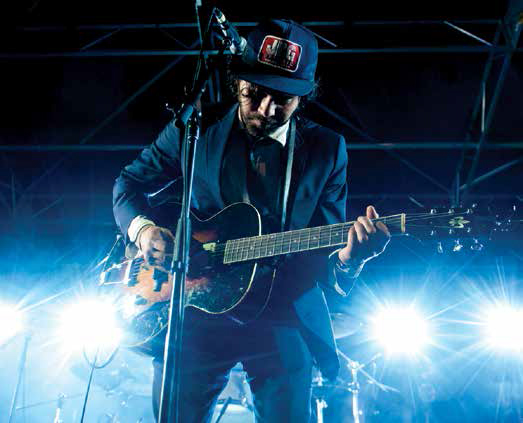At Work: Shakey Graves

When Shakey Graves released his 2011 breakthrough Roll The Bones and started pulling in larger concert audiences, Austin, Texas native Alejandro Rose-Garcia effectively introduced his solo persona: a one-man band armed with a stripped-bare voice, strolling guitar and suitcase bass drum. His theater-trained stage presence lent a confidence to his presentation while his roughly smooth appearance certainly didn’t hurt his appeal. Yet, as he sat on the precipice of his second album, And the War Came, he experienced a distinctly different feeling from his initial go-round: terror.
This time, there seemed to be a little more at stake. Among his concerns was the question of balancing his aspirations as a musician with the expectations of a newly found Shakey Graves audience. “I’m not sure if it’s more important for me to build something that I know I can replicate onstage, or whether it’s more important to build something I might never be able to do again,” says Rose-Garcia. “I think both are really worth the effort and, on this album, both of those got expressed.”
As for the album’s title, inspiration struck on a rainy day in Washington, D.C., following the final night of a recent tour. A self-described ‘futuristic hick,’ a depiction that can just as easily apply to his traveling troubadour alter ego, Rose-Garcia reached back to the nearly 150-year-old speech from the 1865 second inaugural address etched on the Lincoln Memorial. “It was one of those experiences that was intangibly moving,” he recalls. “It felt like what was happening in my life—this is amazing, be-careful-what-you-wish-for thing, accomplishing the tour. And the war came.”
Graceful, intimate and dark, his sophomore effort extends the homegrown immediacy of Roll The Bones, while drawing from an expanded sonic palette. Paper Bird’s Esmé Patterson joins in on a trio of duets, adding beautifully aching harmonies. Shakey and his six-string are backed by a full drum kit on several tracks, perhaps intimating an evolutionary step toward the realization of the complete Shakey Graves experience— one that would present a live performance divided between a one-man band and ensemble renderings of his catalog.
Proudly aware of the tradition that precedes him, Rose-Garcia is respectful of his hometown’s rich musical history, but by no means is he bound to it. When asked about the task of maintaining rustic authenticity for the purists, he makes clear the distinction between art and artist. “I don’t say I only listen to old phonographs because
I don’t. I listen to robot music. I live in the future along with everybody else,” he says. “It’s beneficial to step in and out of a character. Shakey Graves is an intensified, concentrated version of things that I dislike, love or seek out in my own life.”



















